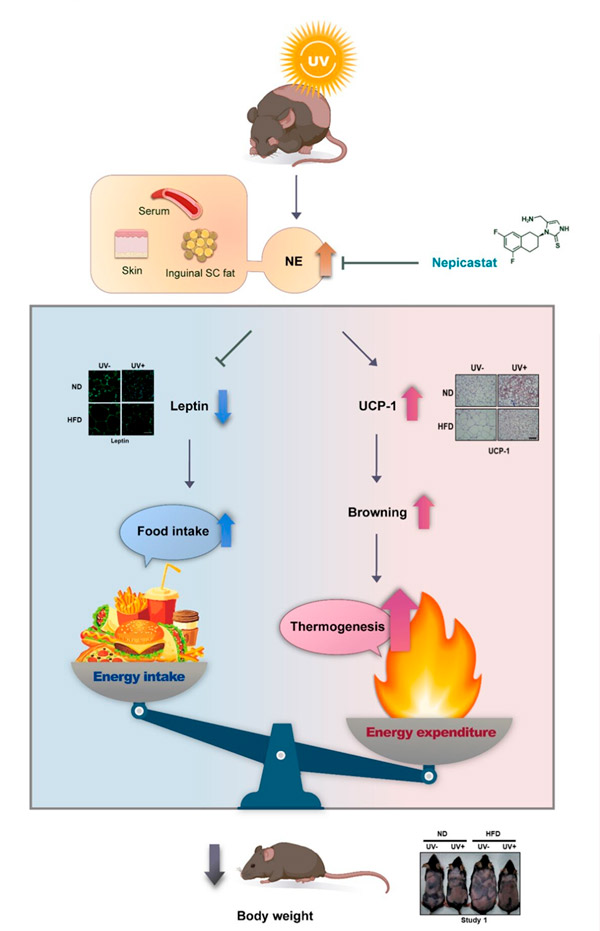Ultraviolet radiation affects subcutaneous fat and may help treat obesity
最近審查:14.06.2024

Obesity and metabolic disorders are becoming increasingly significant global health problems. In a new study, a team of dermatologists assessed the effects of ultraviolet (UV) radiation exposure on appetite and weight regulation. They found that UV exposure increased norepinephrine levels, decreased leptin levels, and caused subcutaneous fat to “brown,” thereby increasing energy expenditure. These results potentially open up new approaches to the prevention and treatment of obesity and metabolic disorders. Their findings were published in the Journal of Investigative Dermatology.
UV radiation is a common environmental factor that has a variety of effects on the skin, which covers a large surface area of the body. UV radiation causes harmful effects such as sunburn, photoaging and ">skin cancer; however, it is also associated with beneficial effects such as vitamin D synthesis.
Study co-authors Drs. Qing-Ling Chuan and Dr. Eun Joo Kim from the Department of Dermatology at Seoul National University Hospital explained: “Recent evidence suggests that UV exposure limits weight gain in mouse models of obesity. Subcutaneous fat is a critical organ in regulating energy homeostasis. Along with previous research on the effects of UV radiation on obesity and metabolic disorders, our team was inspired by our previous discovery that although UV rays do not directly reach subcutaneous fat when exposed to the skin, they can regulate subcutaneous fat metabolism. This led us to hypothesize that skin exposure to UV rays may play a significant role in systemic energy homeostasis, which was the impetus for this study.”
Researchers found that when exposed to chronic UV light, mice fed normal and high-fat diets showed increased appetite due to a decrease in leptin, a key hormone in regulating appetite. However, no weight gain was observed. They found that UV radiation prevents weight gain by increasing the secretion of the neurotransmitter norepinephrine, which not only reduces leptin, but also increases energy consumption due to the “browning” of subcutaneous fat.
Increased energy consumption caused by increased appetite is converted into heat and burned before it can be stored in subcutaneous fat, preventing weight gain.
This study provides new data on the effects of UV radiation on appetite and weight regulation, opening the door to new approaches in the prevention and treatment of obesity and metabolic disorders. In particular, uncovering the mechanism by which UV radiation prevents weight gain may offer new approaches to dietary management and weight loss, providing innovative insights into health and obesity management that can positively impact human health.
Lead researcher Dr. Jung Jin Ho from the Department of Dermatology at Seoul National University Hospital and Seoul National University College of Medicine explained, “This study explains the mechanism by which UV radiation can increase appetite while suppressing weight gain. These findings significantly contribute to the understanding of the effects of UV radiation on energy metabolism and homeostasis and open new opportunities for the development of strategies for the prevention and treatment of obesity and metabolic disorders.

Radiation enhances the secretion of norepinephrine, which not only reduces leptin levels, increasing food intake, but also increases energy expenditure by converting subcutaneous fat into brown fat. Source: Journal of Investigative Dermatology.
“Remarkably, the finding that leptin levels decrease and norepinephrine increases under UV exposure, thereby promoting subcutaneous fat browning and increased energy expenditure, provides revolutionary clues for the development of obesity treatment strategies. This study demonstrates that UV radiation not only affects the skin, but also plays an important role in energy metabolism and homeostasis in the body. However, further research into the long-term effects and safety of UV exposure is needed, and there should be significant interest in developing new therapeutic approaches that take advantage of the effectiveness of UV radiation."
However, as study co-author Dr. Lee Dong-hoon of the Institute of Human-Environment Biology at Seoul National University noted, “Because UV radiation can accelerate skin aging and cause skin cancer, it is recommended to minimize exposure to UV rays and protect the skin with using sunscreens. Therefore, our research group plans to conduct follow-up studies to develop new strategies that could mimic the effects of UV radiation to regulate obesity and metabolic processes."

